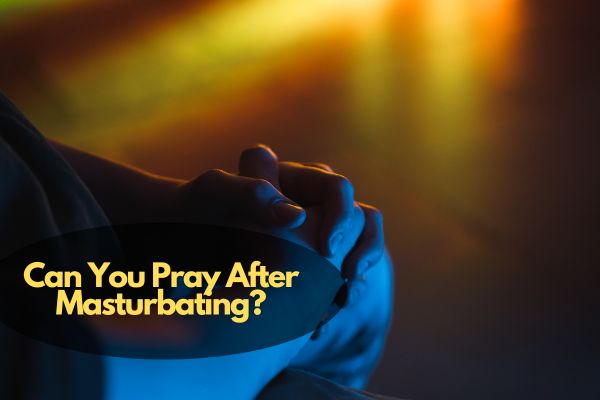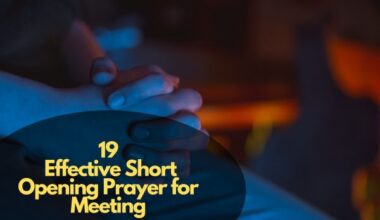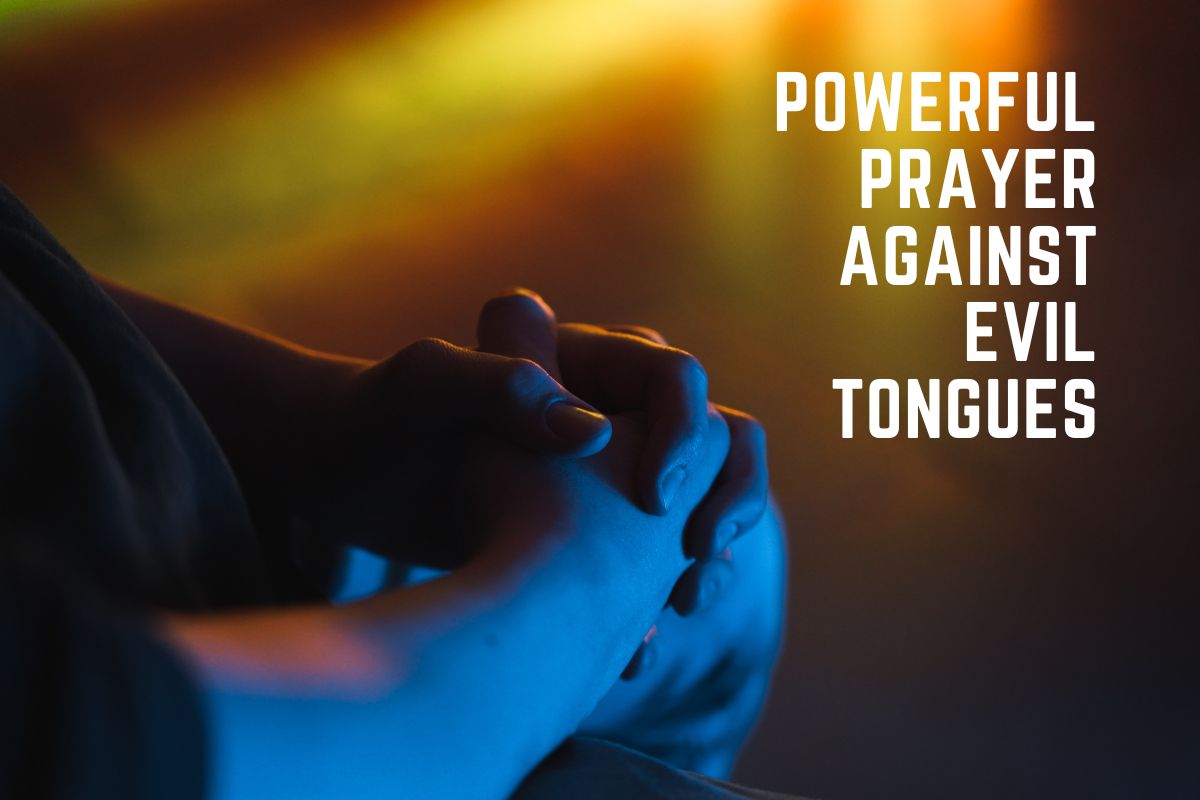Table of Contents Show
Praying after masturbation is a topic that carries different weight and perspectives for individuals across various cultures and faiths. It’s crucial to understand the multifaceted aspects and the impact it may have on one’s spiritual and mental well-being.
Can You Pray After Masturbating?
YES! The act of prayer holds deep significance in many people’s lives. However, the question of whether one can pray after masturbating raises complex considerations due to the intertwining of religious, moral, and personal beliefs.
Importance of Prayer
Prayer holds significant value in various aspects of human life, transcending religious boundaries and serving as a means of connection with the divine or a higher power. It acts as a channel for expressing gratitude, seeking guidance, finding solace, and fostering inner peace.
In a broader sense, prayer is a form of communication with the spiritual realm, allowing individuals to articulate their thoughts, desires, and concerns. It serves as a meditative practice that aids in calming the mind and soul, promoting mental clarity and emotional well-being.
Moreover, the act of prayer often instills a sense of community and togetherness, especially in shared or congregational settings. It creates a bond among individuals with similar beliefs, strengthening their spiritual connection and offering support in times of need.
The ritual of prayer also encourages self-reflection and introspection, fostering personal growth and providing a space for contemplation. It enables individuals to acknowledge their values, aspirations, and shortcomings, thereby aiding in personal development and inner peace.
For many, prayer acts as a source of hope, providing comfort and a sense of reassurance during challenging times. It offers a way to cope with difficulties, fostering resilience and the belief in a higher purpose or plan.
Overall, irrespective of religious affiliations, prayer stands as a fundamental practice that contributes to spiritual, mental, and emotional well-being, fostering a sense of connectedness and peace within oneself and with the world around.
Handling Guilt and Spiritual Concerns
Feelings of guilt and spiritual concerns often arise after engaging in acts that may conflict with personal or religious beliefs. Masturbation, a private and natural act for many, can sometimes lead to such internal struggles.
Acknowledging and addressing these emotions involves understanding one’s personal beliefs, values, and the teachings of their faith. It’s essential to realize that perceptions about this act can vary widely across different cultures, religions, and individuals.
Firstly, it’s crucial to recognize that feelings of guilt may not necessarily align with the broader perspective of one’s faith. Seek to understand the teachings or interpretations of religious doctrines regarding this specific issue. Engage with texts, seek guidance from religious leaders, or discuss with mentors who can offer insights and advice.
Self-reflection plays a pivotal role in managing such feelings. This involves understanding the roots of guilt or spiritual unease, questioning whether these emotions are innate or influenced by societal norms or religious teachings.
Forgiveness and self-compassion are also vital. Recognize that everyone is subject to human experiences and that making peace with oneself is a part of the journey. Seek methods to reconcile these feelings through personal rituals, prayers, or seeking forgiveness from a higher power, if applicable in your beliefs.
In case the guilt or spiritual concerns become overwhelming, seeking guidance from mental health professionals or spiritual mentors can be beneficial. These individuals are equipped to offer support, guidance, and a non-judgmental space to discuss such concerns, aiding in the process of resolving internal conflicts.
Lastly, remember that spiritual growth is an ongoing journey. It involves constant self-discovery, evolving beliefs, and the navigation of one’s moral compass. Embrace this journey with openness, seeking clarity and understanding while prioritizing mental and emotional well-being.
Seeking Guidance and Support
When grappling with complex questions surrounding personal beliefs, spirituality, and potentially conflicting actions like masturbation, seeking guidance and support can be immensely beneficial.
Firstly, consider engaging in open discussions with trusted individuals, such as religious leaders, mentors, or even close friends and family. These conversations can offer diverse perspectives and insights, aiding in the clarification of doubts and conflicts.
Seeking guidance from religious or spiritual mentors plays a crucial role in gaining a deeper understanding of one’s faith and its teachings. These individuals are often well-versed in religious texts and can offer interpretations and guidance specific to your concerns.
Additionally, community support is invaluable. Sharing experiences and concerns within a supportive community can provide a sense of belonging and understanding. Community settings, whether in-person or online, can offer comfort, shared experiences, and practical advice in navigating conflicting emotions.
Exploring written resources and texts related to spirituality and ethical behavior might offer clarity. Consider delving into religious texts, philosophical writings, or self-help books that address the intersection of personal beliefs and everyday actions. Such readings can shed light on diverse perspectives and interpretations.
In cases where the internal conflict leads to emotional distress or mental health concerns, seeking professional help from mental health practitioners or counselors is highly recommended. They provide a safe and non-judgmental space to discuss inner conflicts, helping individuals navigate complex emotions while prioritizing mental well-being.
Remember, seeking guidance and support is a proactive step toward resolving internal conflicts. It’s a means of gaining clarity, finding comfort, and fostering a balanced approach to spirituality and personal actions.
Would you like more information or further discussion on this topic?
Mental Health and Well-being
The intersection between spirituality, personal beliefs, and mental health is intricate, especially when dealing with conflicting emotions arising from actions like masturbation.
Maintaining good mental health is crucial for overall well-being. When experiencing guilt, confusion, or distress due to conflicts between personal actions and religious beliefs, it’s essential to prioritize mental health alongside spiritual considerations.
Acknowledging one’s emotions and their impact on mental health is the first step. Recognize that such internal conflicts can lead to stress, anxiety, or a sense of dissonance between personal actions and religious teachings. Understanding and accepting these emotions is vital for finding resolution.
Seeking a balance between spiritual beliefs and mental health is crucial. While spirituality is integral to many, mental well-being should not be compromised. Balance involves understanding that self-compassion, self-care, and seeking support are pivotal in maintaining good mental health.
Engaging in activities that promote mental well-being is highly recommended. Practices like mindfulness, meditation, or engaging in hobbies that bring joy and relaxation can significantly contribute to managing stress and fostering a positive state of mind.
Seeking professional help from mental health practitioners or counselors is encouraged. These professionals can provide valuable guidance, offering strategies to cope with conflicting emotions, addressing mental health concerns, and helping individuals navigate such internal conflicts in a healthy manner.
Lastly, finding a supportive community or creating a network of understanding individuals can offer solace and practical advice. Sharing experiences and concerns within a supportive environment can contribute to a sense of acceptance and understanding, reducing feelings of isolation or distress.
Striking a balance between spiritual beliefs and mental well-being is crucial for leading a fulfilling and harmonious life. By acknowledging the importance of mental health alongside personal spirituality, individuals can navigate internal conflicts in a healthy and constructive manner.
Conclusion
Navigating the intersection between masturbation, spirituality, and prayer requires a personal understanding of one’s beliefs, seeking support and guidance, and prioritizing mental health alongside spiritual concerns.
FAQs
- Is it a sin to masturbate according to all religions? Different religions have varying perspectives on masturbation, with some considering it a sin while others may view it differently.
- Can someone pray after masturbating, or does it invalidate the prayer? This can depend on personal beliefs and the religious teachings one follows. Seeking guidance and clarity from religious authorities may provide better insight.
- How can one handle guilt or spiritual conflicts after masturbating? Self-reflection, seeking forgiveness, and understanding one’s personal beliefs are essential steps. Seeking support or guidance from mentors can also be beneficial.








